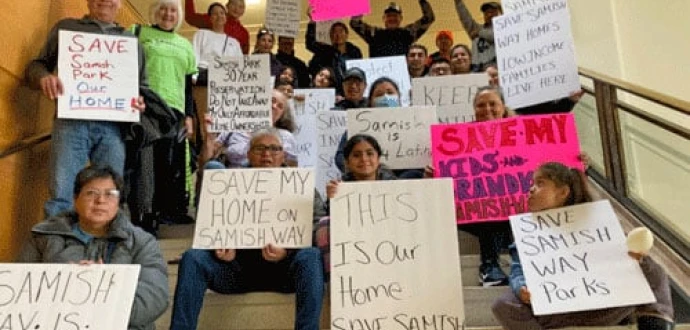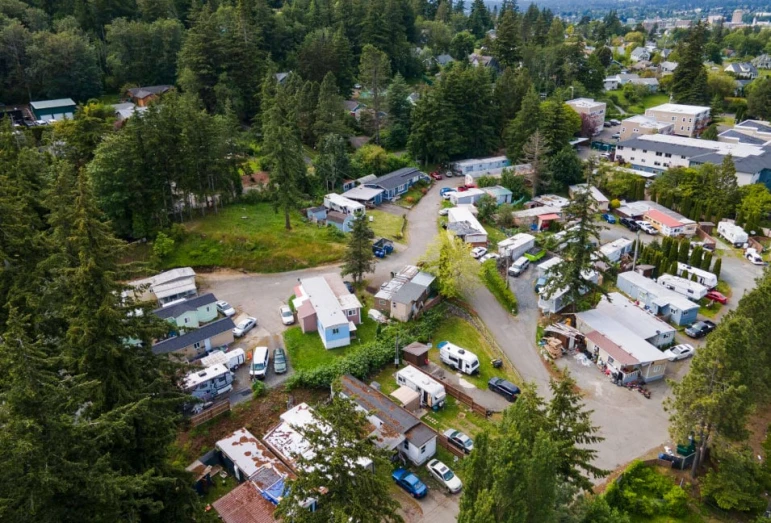
Washington neighbors secure long-term stability and control with community purchase
BELLINGHAM, Wash. – Sharon Kirkman moved to Samish Park Mobile Home Park in 2017 because of the location and the affordability. Her grandson wanted to attend a local culinary school and the community is close to a public transit line.
What she didn’t know was that she would help spearhead a community movement toward resident ownership that spanned nearly six years.
On March 15, homeowners became a ROC, renaming the community Samish Park Homeowners Cooperative, and purchasing it for $4.8 million, financing the community with loans through the Washington Community Reinvestment Association, Washington State Housing Finance Commission and a grant from the Department of Commerce. ROC Northwest, a program of the Northwest Cooperative Development Center guided the ROC through the process.
Samish Park is the 26th ROC in Washington and the 325th ROC in the country. The 32-home community is in the heart of Bellingham, a beautiful coastal city about 90 miles north of Seattle.
“We are close to the college area, trails, grocery stores and behind our park is an arboretum. People move here because it’s affordable,” said Kirkman, who served as the Interim Board President. “Families need affordability just as much as seniors do and now our park will never be changed. It will always remain a manufactured home park no matter what. I just can’t say how lucky I feel because this never should have happened.”
Shortly after she moved to Samish, her grandson started to look at the development happening north of the community.
“It was apartments and he said, ‘What do you think will eventually go right here?’” she recalled, answering, “Apartments.”
She immediately started googling and found that the community she called home was for sale. She received a notification in the mail that confirmed her fear – the new owner was a developer who planned to build apartments.
Then came Covid, which delayed local planning meetings and future development. Those postponements helped Kirkman and her neighbors organize and formulate a plan to save their community.
Anne Sadler, President at the Association of Manufactured Home Owners (AMHO), had encouraged and supported Samish Park homeowners by testifying at city council meetings on their behalf, first contacted residents in 2019 to let them know what they needed to do if the park came up for sale – form a cooperative.
“After almost nine years of promoting and representing the rights of manufactured homeowners in Washington state through AMHO,” Sadler said. “I have come to the conclusion that the only way we will ever have, or enjoy, any type of security while living in the manufactured housing communities is to own the ground we live on.”
Throughout their journey, Sadler continued to advocate for the community and notified them of an important City Council meeting in October 2022, which would determine if Samish would be redeveloped or included on a list of protected manufactured home parks.
Samish Park is a mix of retirees, blue-collar workers and immigrant families. Kirkman said she spent most of her 35-year career in public health working with the Latino population, which helped her communicate with her neighbors.
“I worked with two bilingual Latina nurses, and they taught me so much, and I understood how I needed to explain to my Latino neighbors how important it was that we all showed up at these meetings to fight for our community,” Kirkman said. “I was the right person in the right place at the right time, and I just kept pushing and pushing and pushing to keep the movement going forward.”

Photo Courtesy of Hailey Hoffman / Cascadia Daily News
Kelly Owen of Northwest Justice Project accompanied Kirkman and other resident leaders, going door-to-door several times to explain to the community’s primarily Spanish-speaking residents about the importance of becoming a cooperative and community involvement. They urged everyone to attend the October city council meeting, which was being held on a Monday afternoon while most people were at work.
Kirkman said she bought posterboard and markers for her neighbors to make signs, to communicate with the city council members that they wanted to remain a manufactured home community.
“Mothers pulled their children out of school, and everyone made signs so we could show up to that meeting that they usually held in the evenings,” she said. “We were all sitting there, and they had to look at our signs before they talked about the 30-year preservation of 10 manufactured home parks that hopefully included us. One of the city council members started crying and said, ‘We see you. We see all of you.’ Two of the people sitting on the other side of her grew up in manufactured housing with single mothers. They voted the 30-year preservation through.”
In September 2023, homeowners at Samish received a certified letter that the park was for sale and they had the opportunity to purchase the land beneath them. In January, they partnered with ROC Northwest to organize their community and adopt cooperative corporate documents to run and operate their manufactured home community.
“Samish Park residents have taken up the challenge of owning and running their own park,” said Luis Sierra, Cooperative Development Specialist at ROC Northwest. “Members stepped up to serve on the Board and residents participated in every meeting to help put together their future community’s rules. They identified key parts of their park they know they want to improve for everyone’s health and safety and immediately got to working on them as soon as the purchase was completed.”
Prior to purchase, like most manufactured home communities, residents of Samish Park owned their homes but not the land beneath them. This arrangement leaves homeowners vulnerable to rent increases and eviction, a risk that can increase when the properties are put on the market. By purchasing the property themselves, homeowners now vote on major decisions like community rules, infrastructure projects and site fees.
It’s this last piece that has put a spotlight on resident ownership of manufactured home communities as one solution to the affordable housing crisis. On average, resident-owned communities raise site fees at a fraction of the industry average. For homeowners in Samish Park, this long-term affordability means long-term stability.
“The rent was $475 in 2017 and it was $900 in 2023 and it was going to keep going up if we didn’t do something,” Kirkman said. “When we purchased, the rent went up to $1,300 and we knew that it would have to increase to be able to own it,” Kirkman said. “This process allowed us to take back our park. We get to make decisions moving forward – repairing chain link fences, patching up potholes, resurfacing streets. I am very happy with the purchase. I feel so fortunate that it happened.”
